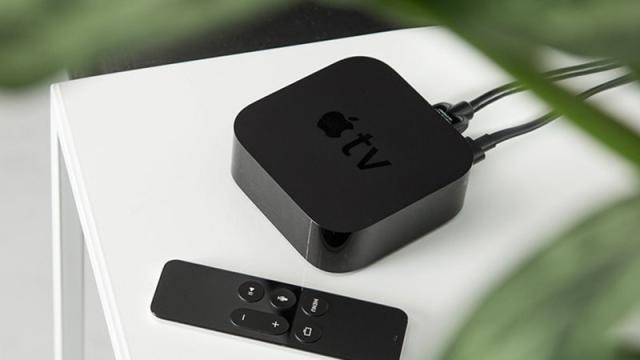Apple is gearing up for its annual product announcement in September where it will reportedly debut a more expensive iPhone and a new 4K Apple TV. Apple wants to be able to tell customers that they can get 4K movies for a slightly less-extortionate price than its competitors are offering, but movie studios hate this idea and both sides are out of their minds.
Image: Gizmodo
Apple is furiously negotiating with Hollywood studios to bring down the cost of 4K movie purchases in iTunes to $US20 ($25), while the studios would prefer to keep it in the $US25 – $US30 ($31-$38) range, according to the Wall Street Journal. For Apple, lower 4K movie prices would help it demonstrate some upside to buying a new Apple TV, which, according to a recent industry report, is rapidly losing the streaming wars to cheaper devices such as the Roku.
But studios don’t want to budge on the premium that they’re currently charging. “I wouldn’t tell Apple how to price their iPads,” one movie executive told the Journal. And that executive has a great point. With Apple losing ground in the movie rental and purchase business to rivals such as Amazon, it’s hard to see how the tech giant has any leverage in this negotiation. But studio execs should take a look at the world around them and realise that this pricing is absurd.
The home video business sees the high-resolution 4K format as a kind of equivalent to 3D at the movie theatre. It’s a way to charge extra cash for an enhanced product, and it’s a strategy for holding back the unstoppable wave of streaming subscriptions. Because 4K files are so large, downloading the file is more practical than dealing with buffering and often degraded streaming quality. Now that more people have the ability to actually take advantage of 4K with their televisions, this is a revenue stream that has potential. Sadly, Hollywood is happy to screw up its opportunity.
Sales and rentals of movies and TV shows declined by seven per cent in 2016, largely because people are content with subscription services. At the same time, we’re viewing and producing so much more content. According to a recent Zenith survey, people in North America consumed 10.2 hours a day of media in 2016, and that number is expected to rise by another 21 minutes in 2019. Just that rise means everyone in North America could fit another episode of a sitcom into their day-to-day life. An analysis by 21st Century Fox’s FX Network found that the number of scripted television shows has increased by 71 per cent in the last five years, with 455 scripted shows airing in 2016. The film market is more difficult to quantify, but just going off of movies released in cinemas, 736 films were released in 2016 — twice as many as in 2000. On top of this glut of stuff to watch, we have a must-see TV culture that demands people keep up with the hottest shows in order to be part of the conversation. All of this adds up to a world in which there’s less rewatching of movies people have seen before, and the value of individual pieces of content is far lower.
But some people really want to own their videos, and Hollywood’s approach to that kind of customer is to screw them as hard as possible to make up for the lack of interest from the rest of the public. At least with DVDs and Blu-Rays, you get an object and maybe some cool packaging. Charging $US30 ($38) for a file that lives in a DRM’d garden like iTunes is absurd. Apple pushing for a lower price is great, but $US20 ($25) is still too high. You know what’s a good price for purchasing a digital movie? Ten bucks. Charge people $US10 ($13) and they will be willing to pay for that one film that they can’t find on Netflix.
The average price of a movie ticket in the US is $US8.65 ($11), so people can do the mental maths, consider the fact that paying $US10 ($13) to watch something they haven’t seen isn’t crazy, and they can justify the cost because they will own it. On the other hand, if they haven’t seen the film but it’s $US30 ($38), many people won’t even consider that purchase. But they can rent it you say? Rentals cost too much as well. A rental should be $US5 ($6), at the most, every time. Then you get the public weighing their options. They could pay $US5 ($6) to rent it or $US10 ($13) to own it forever. Many people would just go for the purchase, especially if it’s something they’re looking to watch for the second time.
Collectors are going to collect, it’s just part of their DNA. If you charge $US30 ($38), they will pay it over and over until their budget is exhausted. If you charge $US10 ($13), they will pay it over and over until their budget is exhausted. Collectors would spend the same amount of money every month, they’d just have a bigger collection. And the digital file costs very little to deliver, aside from the cut that Apple or Amazon takes.
Studios are so stuck in an old mindset that they’re totally missing the fact that lower prices could actually transform into more money. Ten bucks may be the magic number. As for Apple, 4K video still isn’t going to do it much good as long as iTunes continues to suck.
